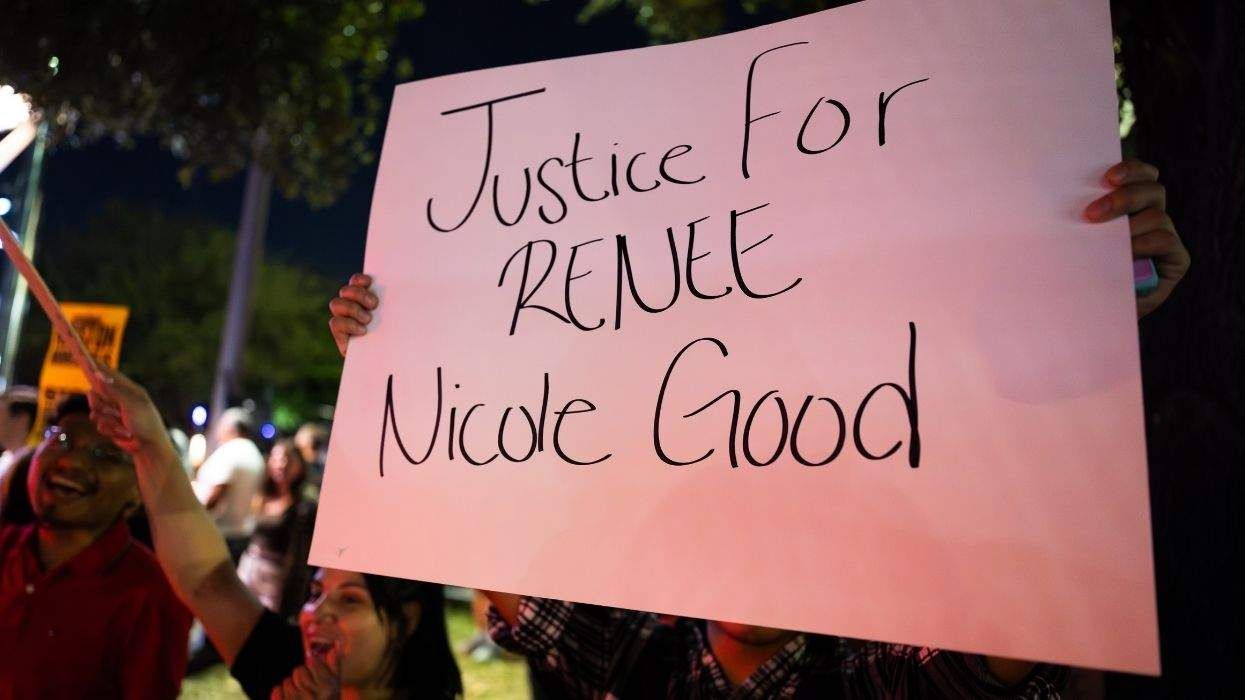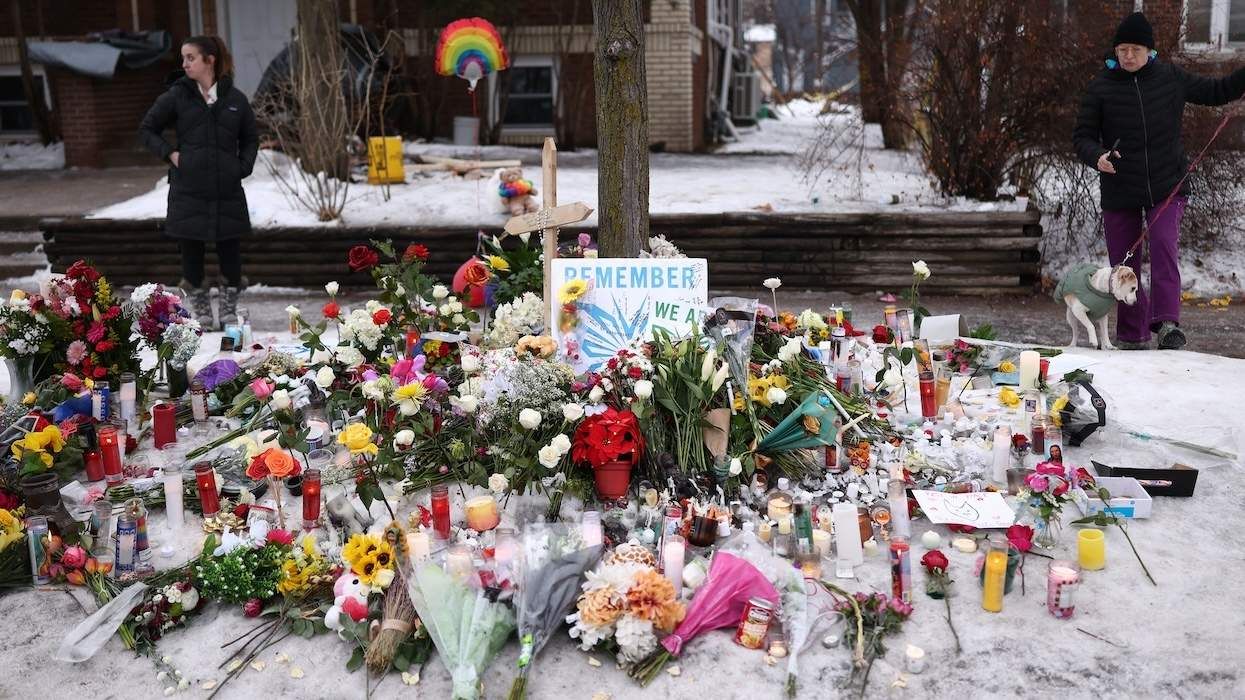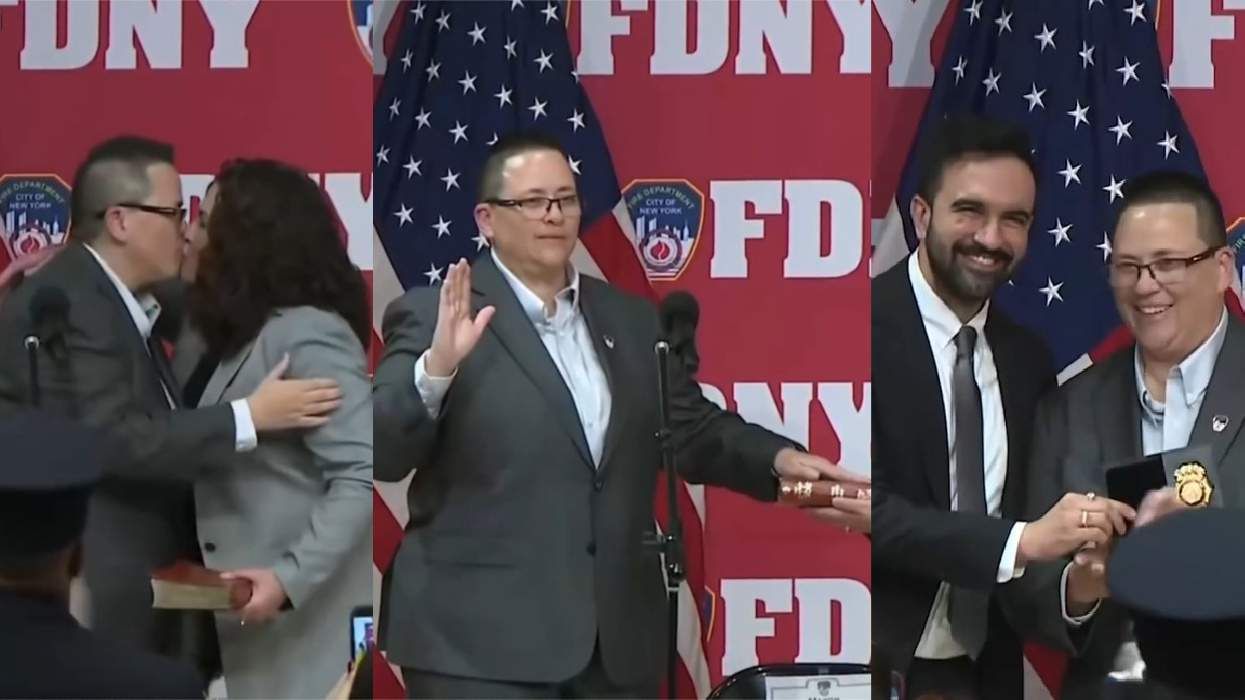In 1970, a group of women lead by the late Ivy Bottini ferried across the water to the Statue of Liberty with chunks of fabric hidden under their dresses. They had it folded up over their stomachs making them look as if they were pregnant.
Once they arrived, they climbed up to the statue, put the fabric together, and hung it over the railing to form a gigantic banner that read, "Women Of The World Unite." They proceeded to take over the monument in celebration, singing, playing the guitar, and dancing in a kickline, until the police arrived by boat.
I first heard about this story while living in West Hollywood, blocks away from Ivy Bottini, it turned out. The more I learned about Bottini -- she worked with Betty Friedan and the National Organization for Women in the 1960s before being forced out for being gay, and then dedicated her life to LGBTQ+ rights -- the more impressed I became, so on a Sunday afternoon in early 2019, I knocked on her door and introduced myself. I spent a handful of afternoons with Bottini, hearing stories of what it was like being a lesbian in the pre-Stonewall days, going through her paintings (she was an accomplished painter), and one day, I brought my mic to record with her for The Advocate's interview podcast, LGBTQ&A.
Bottini died last week on February 25, 2021 at the age of 94.
To celebrate the legacy of a pioneer in our community, someone who fought to make the world a better, safer place for us all, LGBTQ&A is reairing our interview with Bottini.
You can listen to the full interview on Apple Podcasts or Spotify, or read an excerpt below.
Jeffrey Masters: You've said that you didn't know being a lesbian was an option, but that you also had crushes on women throughout your life.
Ivy Bottini: Oh, I started with a major crush on our gym teacher when I was in kindergarten, Miss Rose. She could whistle through her teeth. Oh my God.
JM: How were you interpreting those feelings?
IB: Very painfully. It was an agonizing time in my life because not only was I having these feelings, but I had two daughters and a husband. It was probably just about the worst thing that happened to me along the way, the feeling that I'm fighting with two identities and it was a horrible, horrible, horrible time.
JM: Did those feelings go away when you started to live openly?
IB: Not until I finally made the choice that I will embrace the fact that I'm a lesbian.
JM: How old were you?
IB: God, I think my early 50s, late 40s. You know, I honestly don't know. It was right around there. I knew I loved women all along growing up. That was clear to me. I didn't know that it could be a choice because I didn't know there were really other lesbians that felt the same way I did.
JM: Do you remember your first kiss with a woman?
IB: I have to think who it was. Yes, I do. After I graduated from high school and even art school. One night, I said to one of the players on my basketball team, "Take me to a gay bar." That was a big, big request for me. I mean, it's acknowledging that I wanted to participate or see if there was a place for me. I ended up dating a woman that I saw at the bar a couple of nights later when I went back by myself. Her name was Nancy and that was the first time I ever kissed a woman.
JM: What did it feel like?
IB: I was thinking, "Am I doing this right?" And then, I felt, "Well, if I kissed a man and then kissed a woman, it's got to be the same kind of kiss." Yeah, I liked kissing women.
I've had three relationships in my life over a period of time. Nancy and I never lived together although she was in my life a lot. But the next two, we did live together. I finally understand what happened to my relationships. The movement always came first and relationships came second. And that doesn't work with a partner. Eventually, they start to resent being second and start looking elsewhere.
JM: Was that a conscious decision to always put the movement first?
IB: No. It's just what I realized I've done over my life. It took me many, many, many, many, many years. It's only fairly recently because I was really looking at my life and how events had impacted me.
JM: Did the movement also interfere with your relationship with your kids?
IB: Well, yes, because I moved to the city and they stayed with their dad. We would get together and talk on the phone. You know, that kind of long-distance relationship.
JM: Did you have kids because you wanted to be a mother or was it simply what was expected for you back then?
IB: No. I wanted to have kids, absolutely.
JM: Now in your 90s, do you think about your death?
IB: Yes, I do. I find death is a big waste of time when you could be alive doing something. But I'm getting used to the idea. I really do think it's a waste of time. I swear to God, I do. It makes no sense to me. If you're a productive human being, why do you have to leave?
Listen to the full podcast interview on Apple Podcasts or Spotify.
LGBTQ&A is The Advocate's weekly interview podcast hosted by Jeffrey Masters. Past guests include Alok Vaid-Menon, Pete Buttigieg, Laverne Cox, Miss Major Griffin-Gracy, and Roxane Gay. Episodes come out every Tuesday.















Charlie Kirk DID say stoning gay people was the 'perfect law' — and these other heinous quotes
These are some of his worst comments about LGBTQ+ people made by Charlie Kirk.